 MyDogBreeds
MyDogBreedsBoth Toy Mi-Ki and American Molossus are originated from United States. Toy Mi-Ki may grow 36 cm / 14 inches shorter than American Molossus. Toy Mi-Ki may weigh 43 kg / 94 pounds lesser than American Molossus. Both Toy Mi-Ki and American Molossus has same life span. Toy Mi-Ki may have less litter size than American Molossus. Both Toy Mi-Ki and American Molossus requires Moderate maintenance.
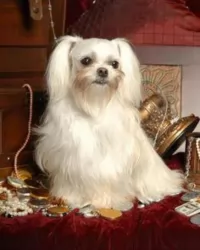 The Toy Mi-Ki is a sociable companion dog. He hasn’t got a long history, and the little bit of history there is, isn’t clear.
The Toy Mi-Ki is a sociable companion dog. He hasn’t got a long history, and the little bit of history there is, isn’t clear.
It is believed that the breed was bought about by Maureen Westburg. It was in the 1980s that she crossed several toy breeds to develop the Mi-Ki. It is thought that she gave the dog the name Mi-Ki because her name was Mikkie. It seems whe wanted a dog that came close to looking like a gremlin.
Some of the dogs used in the breeding program were the Japanese Chin, the Maltese, and the Papillon. The International Miki Registry is trying to get recognition with the United Kennel Club for this dog. There are other canine clubs and organizations that recognize the Mi-Ki Dog as a breed.
Based on the massive dog of Mesopotamia in 5000 BC, the American Molossus is the same dog recreated in the United States by and for the lovers of these giant dogs. The ancient Molossus was fierce to look at, massive in size, courageous and loyal. He was undaunted by any animal and stood up to any man attempting to hurt his master. When Rome fell the descendants of today’s Molossus were scattered and attempts to revive the breed have created carious large dogs. The American Molossus is the first true recreation that hits the mark.
The original Molossus was one of the most primitive of dogs, one of the earliest dogs that men domesticated. Their initials duties were the guarding of herds and homes against all enemies. They were incredibly loyal to their one master and stayed with him and protected him. These dogs also ate carrion and served the villages by eliminating animal carcasses. They could handle any other hunting animals such as wolves and large cats. This dog, although extinct was the ancestor of all the Mastiff-type dogs of today. The Molossus is said to be the ancestor of the St. Bernard, English Mastiff, Greater Swiss Mountain Dog, Bernese Mountain Dog, Newfoundland, Great Dane, Great Pyrenees, Rottweiler, Rottweiler and the Neapolitan Mastiff. Now these breeds have become the ancestry of the American Molossus.
According to Marcus Curtis, the founder of the new Molossus, the nearest relative of the American Molossus is the Neapolitan Mastiff. The Hines Bulldog, German Rottweiler, American Bandogge, and South African Boerboel together with the Neapolitan Mastiff were used to form the American Molossus. The goal of the founder was to make a great family pet and protector. It was specifically bred to be courageous, loyal and protective.
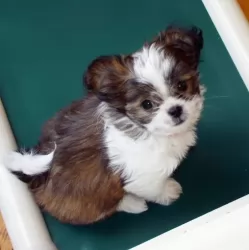 The small Toy Miki stands at between 25 cm – 30 cm in height and weighs between 2 – 5kg. You get two different coat types – long and short and the long-haired variety also has quite a bit of hair around the face.
The small Toy Miki stands at between 25 cm – 30 cm in height and weighs between 2 – 5kg. You get two different coat types – long and short and the long-haired variety also has quite a bit of hair around the face.
His longish coat is low-shedding which makes him popular for people who battle with allergies. The Miki Dog will produce about 2 – 4 puppies.
As a toy dog, he has a domed head with large eyes. Their ears are feathered and are carried erect and the tail is long and feathered.
These little dogs are popular companion dogs and they’re intelligent and loving, making the ideal pet for anyone.
It’s a friendly dog and yet he will bark to alert you of an intruder. Youll take notice because he isn’t the kind of dog that just yaps away.
Children love them and they make great playmates for children who have been taught to be kind and gentle with animals.
Their small size and their adaptable nature make them suitable for city or country living. Sweet and amicable, the social purebred Toy Mi-Ki is everything you want in a companion.
He is loyal and devoted, calm and adaptable. They’re not the kind of dogs to go jogging with you, but nonetheless, he will still need his exercise – walks every day as well as ball games.
This is a giant, massive dog in every way and this recently developed standard makes that very clear. The Molossus should be heavy bones, muscular with a lot of loose skin and wrinkles of all kinds, everywhere. He is an intimidating presence, with a massive square head, broad shoulders, height and mass. No, the American Molossus is not athletic, but he certainly is intimidating.
His head is massive in comparison to his body and it must be square. He has extensive wrinkles and pendulous lips and dewlap. The face is all folds of skin and wrinkles. Deep set eyes, drooping upper lids and lower lids as well as an intimidating expression. His brow is well developed with a marked frontal furrow. The nose is large, and the muzzle is about a third of the length of its head. It is short and broad. Everything about the head must be square. It’s neck and body are powerful and muscular. The chest is deep, wide and barrel like. The back is also powerful and muscular. The front legs are heavy and muscular while the hind legs are broad, strong, powerful and wide-stance. Do not remove the front dew claws. His tail is thick and wide then gradually tapers at the tip.
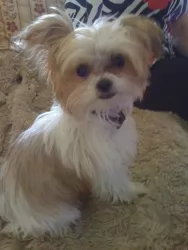 The Mi-Ki is calm and good-natured, and because of his cuteness, he can’t help but become a lap dog, if you allow him.
The Mi-Ki is calm and good-natured, and because of his cuteness, he can’t help but become a lap dog, if you allow him.
He is social and just loves human companionship. He is friendly too and will quite happily be friends with children and pets in the home.
Make sure he is trained and socialized so that you become one of the many people who have nothing but good things to say about this sweet little dog.
The American Molossus is an intimidating massive giant bred for protection and guard duty. He is incredibly loyal to his family and courageous in his protection of them. They are guard dogs, not attack dogs. Their simple appearance is usually enough to frighten off anyone intending harm on their families. He is in reality a loving giant. He is intelligent and stable with a strong desire to please his owner. He is a calm yet vigilant presence in the home.
Because the Molossus is so large, it is recommended that the puppy be socialized and trained professionally. It takes a strong owner to handle this breed. They need to know the rules and have the rules consistently applied. The owner must be the pack leader.
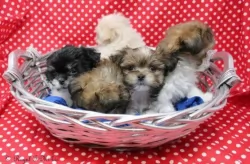 You just have to bear in mind, that because of his short muzzle, he is prone to respiratory problems. Too much exercise and you may find him huffing and puffing. Be careful on a hot day.
You just have to bear in mind, that because of his short muzzle, he is prone to respiratory problems. Too much exercise and you may find him huffing and puffing. Be careful on a hot day.
Also, little dogs like this often have all kinds of dental problems. When you brush him, check his teeth because he can’t tell you if he has a rotten tooth causing him a lot of pain and misery.
Check his eyes too that they are bright and clear and check the inside of his ears. Hypothyroidism and eye issues can also bother the Mi-ki.
Like all Mastiffs the American Molossus faces a variety of potential illnesses, some brought on by its size, some not.
This could easily be a function of its massive size. It is a degenerative disease and can cause the dog to become lame. In many cases the vertebrae can fuse, or severe pain can result. This is mostly seen in older members of the breed.
Male Molossus can contract this inherited metabolic disease primarily. It can be life threatening and very serious as it affects the kidney and the bladder.
This is essentially Cervical Vertebral Instability (CVI) and is caused by the pressure of the nerves in the neck and cervical spinal cord. This compression can cause deformity, pain and abnormal stance/gait. IT has been attributed to the nutrition needs and rapid growth of the Mastiff breeds.
Like all giant Mastiff breeds the Molossus can have skin issues from the wrinkles, dysplasia in the joints which we will address below.
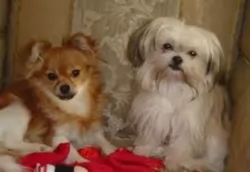 Considered to be low-shedding, the Mi-Ki will benefit from a brush once or twice a week.
Considered to be low-shedding, the Mi-Ki will benefit from a brush once or twice a week.
Some people take their Mi-Ki’s to have their hair professionally cut. This is a good move because then the ears, teeth, and nails are attended to as well.
You can do all of these things at home yourself, but sometimes, particularly with the long-haired Miki, the matting of the hair can make it that you rather send him to professional groomers.
Like all dogs, the Mi-Ki dog will need nutritious food if he is to stay healthy. He isn’t a big eater and you will find the perfect food for your small canine pet.
Read on the packaging to make sure you get high-quality dry food for small dogs. You want the ingredients to be as natural as possible without any toxic colorants and additives.
Meat and protein must always be the top ingredients. Try to provide some home-made food too. Boiled chicken, brown rice, spinach, and sweet potatoes can be chopped up finely and a small portion added occasionally to the dry kibble as a tasty treat.
Remembering that this is a very, very large dog you need to be careful about nutrition and how fast your puppy will grow. American Molossus puppies need four meals a day until 12 weeks old. Then until they are 6 months old feed then 3 times a day. Finally, from 6-month-old puppy to adult – feed them twice in 24 hours.
At one year either feed them once or two small meals.
Many people feed their Molossus eggs, vegetables, fruit, and cottage cheese as ten 5 of the total for the day but avoid other table foods. The Molossus can become very picky about what he eats if you feed him too many table scraps.
In addition to the health problems listed above, the American Molossus is also susceptible to: Ditichiasis – Eyelashes that are in the margin of the eyelids and can cause eye irritation. May require surgery to correct.
Could cause blindness if not removed. Ectropian/Entropion: Eversion and inversion of eyelids which cause ocular irritation.
This is a degenerative disease which causes the dog to go blind. It is a disease the affects the retinal visual cells, first causing night blindness then day blindness. A DNA test is available for detecting PRA in all Mastiff breeds.
Common in large breeds and especially in giant breeds like the Molossus. Multiple forms and causes but all can cause pain and lameness.
Do to wrinkles and loose skin – check often for moisture and infections.
The is a problem based on a variety of possible causes. It happens when the puppy is between 6-16 months of age. Lameness occurs over time in one limb or in all. It can be intermittent and might be caused by diet, genetics, stress, autoimmune or metabolic issues or infection.
This issue is developmental as the dog’s toes turn either inward or outward, then as the condition advances the dog suffers fever, pain in all joints, lethargy and the inability to stand. This happens when the dog consumes too many calories for his activity level in the development times.
The American Molossus is not a couch potato. He needs to be walked at least twice a day and loves to play fetch. He will be greatly benefited by obedience training. Do not overdo it with exercise but make sure they don’t just lay around.